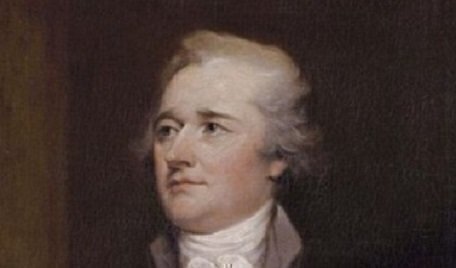 Shays’s Rebellion filled Alexander Hamilton with dread. In 1786, armed men shut down courts in five counties across Massachusetts and, early the next year, marched on the federal armory in Springfield. The mobs included debtors trying to prevent the courts from foreclosing on their farms, and opponents of centralized government. The insurrectionists believed that the newly adopted Massachusetts Constitution, drafted in 1779 by John Adams, would shift power from the poor to the rich, from the many to the few, from the backcountry to Boston, from democracy to aristocracy. They were led by Daniel Shays, a dashing Revolutionary War veteran who’d had to sell a sword given to him by the Marquis de Lafayette to pay his debts.
Shays’s Rebellion filled Alexander Hamilton with dread. In 1786, armed men shut down courts in five counties across Massachusetts and, early the next year, marched on the federal armory in Springfield. The mobs included debtors trying to prevent the courts from foreclosing on their farms, and opponents of centralized government. The insurrectionists believed that the newly adopted Massachusetts Constitution, drafted in 1779 by John Adams, would shift power from the poor to the rich, from the many to the few, from the backcountry to Boston, from democracy to aristocracy. They were led by Daniel Shays, a dashing Revolutionary War veteran who’d had to sell a sword given to him by the Marquis de Lafayette to pay his debts.
Observing the rebellion from New York, Hamilton worried that civil unrest in Massachusetts could augur the rise of a demagogue on the national stage, one who might pander to angry debtors across America and threaten the stability of the new nation. The insurrection was eventually put down by a private army hired by Massachusetts Governor James Bowdoin, after members of the state militia refused his call to do so. But what might have happened, Hamilton wrote, if, instead of Shays, the rebellion “had been headed by a Caesar or by a Cromwell”?
In Hamilton’s view, the greatest threat to the American experiment was a demagogue who might flatter the people, overthrow popular elections, and consolidate power in his own hands. “Of those men who have overturned the liberties of republics,” he wrote in “Federalist No. 1,” “the greatest number have begun their career by paying an obsequious court to the people.”
To read the rest of this article, go to The Atlantic at https://share.google/hSK80pt3e6FZgcTNG. It requires a free trial or subscription to The Atlantic to read the full article.
Jeffrey Rosen is a contributing writer for The Atlantic, the president and CEO of the National Constitution Center, and a law professor at George Washington University. He is the author, most recently, of The Pursuit of Happiness: How Classical Writers on Virtue Inspired the Lives of the Founders and Defined America. Rosen’s new book, Pursuit of Liberty: How Hamilton vs. Jefferson Ignited the Lasting Battle over Power in America, is out in October 2025.







